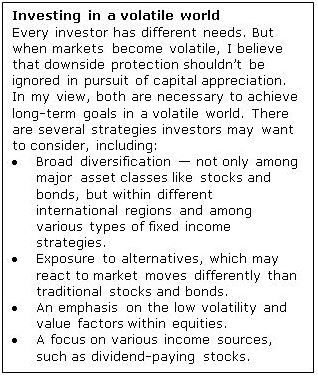Why haven’t geopolitical headlines rattled the markets?
by Kristina Hooper, Global Market Strategist, Invesco Ltd., Invesco Canada
Geopolitical risk has risen in many areas of the world, and we saw several key issues escalate last week. When I travel and meet with clients, I’m increasingly asked why markets don’t reflect these growing risks. Part of the answer is that markets have simply become somewhat immune to it. However, I also believe that two key factors have helped cushion capital markets from the impact of geopolitical risk: accommodative monetary policy and the growing global economy. In this week’s commentary, I discuss all of these competing market forces.
Geopolitical issues worsen
North Korea. First and foremost, the situation in North Korea continues to escalate. Last week, a North Korean spokesperson said that warnings of a possible nuclear test over the Pacific Ocean should be taken literally. Then Japan’s defense minister announced that the threat from North Korea had reached a “critical and imminent level.” Over the past weekend, U.S. Secretary of Defense James Mattis, fresh from a visit to South Korea, warned that the threat of a nuclear attack by North Korea has increased, which has brought a “new urgency” to cooperation between the U.S., South Korea and other allies.
Mattis made it clear that diplomacy remains the “preferred course of action.” However, he also made it clear that the U.S. is committed to defending itself and its allies from North Korean aggression, explaining that, “Any use of nuclear weapons by the North will be met with a massive military response, effective and overwhelming.” It seems that Mattis’ comments were directed at China – while the U.S., South Korea and Japan have increased their sanctions on North Korea, they believe they have not been as effective because China continues to quietly allow some trade with North Korea. The preferred course of action, diplomacy, hinges on China’s cooperation. With U.S. President Donald Trump visiting Asia this week, I would expect a “carrot and stick” approach to winning China’s support for increased sanctions – and adherence to those sanctions – against North Korea by threatening trade protectionism while offering enormous praise for Chinese President Xi Jinping’s growing political strength and consolidation of power.
Spain. The situation turned from bad to worse in Spain last week, as Spanish Prime Minister Mariano Rajoy spurned Catalonia’s request to negotiate the terms of greater independence. In response, Catalonia – which until then seemed reluctant to attempt an actual secession – voted to establish an independent government. This in turn was met with Rajoy’s dissolution of the Catalonian parliament. We may soon see more disruption, as Spain attempts to enforce direct rule and replace Catalonian officials with pro-Spanish-unity administration officials. However, markets have shrugged this off – the yield on the 10-year Spanish government bond rose, but then fell back. Spanish stocks, as represented by the Spanish IBEX 35 Index, have actually risen in recent days.
United Kingdom. In the U.K., Prime Minister Theresa May continues to experience difficulty in negotiating the terms of departure from the European Union. Her recent difficulties, however, have come from within the U.K. Scotland in particular has expressed concern over the limited progress made in negotiations thus far, and are worried that she will not be able to secure a deal in a timely fashion. Scottish Prime Minister Nicola Sturgeon has asked May for confirmation that a transition agreement with the EU will be reached by the end of this year – Sturgeon reportedly told May that she was increasingly concerned Brexit talks would end in no deal.
However, May is also receiving significant pressure from major Tory donors to leave the EU without a deal if she cannot reach favorable terms in Brexit negotiations. They point to the difficult situation the U.K. is in – being forced to agree on a “divorce bill” before making a trade agreement, which removes the U.K.’s ability to use the money as a bargaining chip with regards to trade. It seems that the number of potential outcomes for the U.K. has expanded; in other words, all bets are off.
United States. Charges were filed today in the Trump-Russia probe. Some have suggested this could jeopardize the U.S. tax reform bill, although I believe that is unlikely. After all, many members of the U.S. Congress are eager to produce a tax reform bill, so that they may return to their constituents by next spring with an important accomplishment under their belts.
Monetary policy and economic growth are helping markets shrug off geopolitical risk
As I mentioned above, geopolitical risk is nothing new for markets, which often respond with a short-term reaction or no reaction at all. However, I also believe accommodative monetary policy and the growing global economy are helping provide a cushion.
Monetary policy. While geopolitical risk is rising, monetary policy risk appears to be moving lower. That’s because major central banks are expected to remain somewhat more “dovish” – in other words, more likely to maintain the status quo. In the U.S., Trump is expected to nominate a new Fed Chair this week, and speculation points to Jerome Powell, who joined the Fed Board of Governors during the Obama administration. As I’ve mentioned in previous commentaries, Powell is ideologically similar to current Fed Chair Janet Yellen, and is therefore most likely to maintain the status quo. If he is appointed, it will be a relief, as it means less likelihood of a policy error caused by more rapid “normalization.”
This is also true for the European Central Bank (ECB). Last week, as expected, ECB President Mario Draghi announced the start of tapering. However, the details of the plan aren’t exactly what observers were anticipating. Draghi announced that ECB bond buying would be cut in half starting in January – but that it would continue for a longer time period, until at least September 2018. This in turn suggests that a rate hike will take even longer, given that the ECB has previously suggested rate hikes will only occur well after the ECB asset purchase plan has ended. The idea of a more gradual normalization process should provide some solace to European markets in the face of growing geopolitical turmoil.
A similar scenario is likely in Japan. With Prime Minister Shinzo Abe’s success in the snap elections last week, not only is there a mandate for a continuation of his administration’s fiscal policies, but also its monetary policies. That means the Bank of Japan can continue to pursue its current path of highly accommodative monetary policy.
All of this suggests more accommodative monetary policy from the world’s major central banks – in other words, rates should be lower for longer. In particular, this reduces the threat that balance sheet normalization will be disruptive to the economy, given that it now appears that the process will be very slow and gradual. My two takeaways from this are that 1) emerging markets should benefit from a more dovish monetary climate; and 2) the hunt for income continues in an environment with lower rates.
Economic growth. We got more signs of improvement in the global economy last week, with the U.S. Commerce Department’s initial estimate for gross domestic product (GDP) growth in the third quarter clocking in at 3% annualized. Also last week, GDP growth for South Korea was released, indicating 1.4% growth – the fastest quarterly growth in seven years. We also saw the Ifo Business Climate Index for Germany hit an all-time high in October. French business confidence has also risen again, and Japan has actually experienced six consecutive quarters of economic growth – the longest stretch since 2006.

Key takeaway
In summary, monetary policy can’t shield countries from nuclear weapons, but it can soothe markets. While improving global growth can’t stop secessionist movements, it may improve investor sentiment. And so, at least for the time being, geopolitical risk may not cause markets to shudder. However, we will want to follow the situation closely. In particular, I worry about the vulnerability of the U.S. stock market, despite a good earnings season thus far and low volatility indicated by the VIX index. One reason to be wary is that the Investors Intelligence Survey, widely considered a contrarian indicator, has now registered above the critical 60 level for bullishness for three consecutive weeks. As with every indicator, it is not foolproof, but it does suggest more caution and discernment in choosing investments. It is a reminder that, while investors with longer time horizons typically need capital appreciation, they need to keep in mind the importance of downside protection.
Looking ahead
Expect an action-packed week, with earnings reports in full swing and a slew of central bank meetings – the Bank of Japan, the U.S. Federal Open Market Committee and the Bank of England. The Bank of England’s meeting is particularly important because many expect it to raise rates for the first time in a decade at this meeting. Also on the docket is a possible Fed Chair announcement and U.S. non-farm payrolls, among other important data points.
Subscribe to the Invesco Canada blog and get Kristina Hooper’s market reviews in your inbox.
This post was originally published at Invesco Canada Blog
Copyright © Invesco Canada Blog










